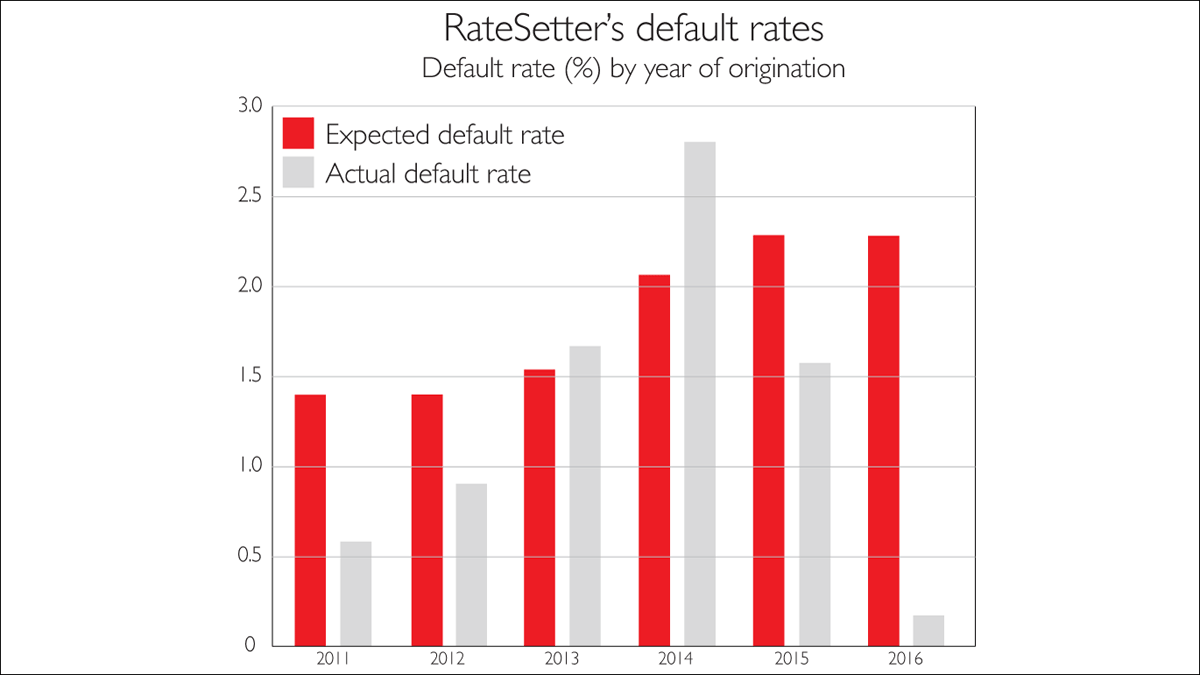P2P default rates on the rise
Raising default rates from loans made in 2014 have caused some investors in the peer-to-peer lending sector to start to worry. Matthew Partridge reports.

Get the latest financial news, insights and expert analysis from our award-winning MoneyWeek team, to help you understand what really matters when it comes to your finances.
You are now subscribed
Your newsletter sign-up was successful
Want to add more newsletters?

The increasingly desperate search for income in a world of falling interest rates has meant that peer-to-peer (P2P) lending where investors lend money directly to firms and individuals through websites such as Zopa,RateSetter and ThinCats has exploded in recent years.More than £500m in loans were originated through RateSetter alone last year.
It has also received a lot of encouragement from the government, who see it as a way to make the financial sector friendlier to small and medium-sized firms, as well as cushioning the blow for savers. Official measures to encourage P2P lending include the introduction of the innovative finance individual savings account (Isa) earlier this year, which lets investors make P2P loans from within a tax-free saving and investing wrapper.
The idea behind P2P is both simple and extremely seductive. Instead of putting your money in a savings account and earning whatever paltry rate of interest the bank deigns to offer, you can cut out the middleman and effectively become a banker yourself. However, unlike a traditional savings account, P2P investments mean that your capital is at risk: if the people or firms to whom you lend default on their repayments, you may suffer losses and these will not be covered by the Financial Services Compensation Scheme (FSCS).
Try 6 free issues of MoneyWeek today
Get unparalleled financial insight, analysis and expert opinion you can profit from.

Sign up to Money Morning
Don't miss the latest investment and personal finances news, market analysis, plus money-saving tips with our free twice-daily newsletter
Don't miss the latest investment and personal finances news, market analysis, plus money-saving tips with our free twice-daily newsletter
P2P websites have tried to address this problem. First, they argue that their quality control, combined with investors spreading their money over a wide range of loans, can keep risks to minimal levels. When they first became established, the various P2P websites took great pains to emphasise their very low default rates. For example, RateSetter says that their loans made in 2011 have had a default rate of 0.59%.
However, there are concerns that this could change as the amounts lent increase and standards fall. In March, Adair Turner, the former head of the Financial Services Authority (the UK's previous financial-services regulator, which has now been replaced by the Financial Conduct Authority), warned that losses from P2P loans in the next decade "will make the worst bankers look like lending geniuses". Unsurprisingly, Turner's remarks drew a lot of criticism and derision from the P2P industry.
Indeed, several figures have argued that his failure to spot the subprime crisis meant that he had little credibility where lending or the financial system were concerned. However, the latest figures from RateSetter raise the question of whether he is sounding the alarm at the right time.
RateSetter recently reported that defaults on loans originated in 2014 already have a default rate of 2.81%, compared with an expected level of 2.1%. Since loans originated in a specific year can last for up to five years, ultimately total defaults for loans made in 2014 are likely to climb even higher.
At the moment, RateSetter diverts a certain proportion of the interest payments into a fund earmarked to cover defaults, known as the Provision Fund (Zopa also does something similar). The size of this fund is based on its own estimates of future losses plus an additional default rate of 0.5% as a buffer. If actual defaults exceed the estimates by more than the value of the buffer, investors may end up with losses.
RateSetter says it still thinks "that the Provision Fund will cover all defaults in 2014". It also says that since most defaults occur before a year, additional losses on the 2014 tranche "are expected to flatten out in future". That said, it's not obvious why loans made in 2014 should be suffering a spike in defaults, given that economic conditions have been favourable. Investors should take this as a reminder that P2P is not a riskless way to earn a bank-account-beating return.
Get the latest financial news, insights and expert analysis from our award-winning MoneyWeek team, to help you understand what really matters when it comes to your finances.

-
 Has the market misjudged Relx?
Has the market misjudged Relx?Relx shares fell on fears that AI was about to eat its lunch, but the firm remains well placed to thrive
-
 Dario Amodei: The AI boss in a showdown with Trump
Dario Amodei: The AI boss in a showdown with TrumpAnthropic’s CEO Dario Amodei was on an extraordinary upward trajectory when he found himself on the wrong side of the American president. He is about to be severely tested.
-
 Best and worst UK banks revealed
Best and worst UK banks revealedWe reveal the best UK banks – and the worst – when it comes to managing your money and good customer service. How does your provider compare?
-
 The best cash ISAs – February 2026
The best cash ISAs – February 2026Savings The best cash ISAs can help you make the most of your tax-free savings. But you may want to take advantage of top rates before they disappear
-
 What is Islamic finance?
What is Islamic finance?Sharia-compliant or Islamic finance banks regularly offer great rates for savers, but how do they differ from Western banks?
-
 The best one-year fixed savings accounts – earn up to 4.25%
The best one-year fixed savings accounts – earn up to 4.25%Savings One-year fixed savings accounts are offering inflation-beating rates of up to 4.25%. We've rounded up the best deals available on the market now
-
 Best savings rates – earn as much as 4.5%
Best savings rates – earn as much as 4.5%Savings The best savings rates on the market pay up to 4.5% on your cash – but you will need to act fast before these top-paying accounts disappear
-
 Smartphone banking: the best app-based bank accounts
Smartphone banking: the best app-based bank accountsNews App-based banks are convenient, come with features that help you budget and make banking easy. What are the best app-based accounts available now?
-
 Best easy-access savings accounts – earn up to 4.5%
Best easy-access savings accounts – earn up to 4.5%Savings Easy-access savings accounts are offering inflation-busting rates of up to 4.5% on your cash savings, but they won't last for long. We look at the best rates
-
 Don't buy pre-paid funeral plans, save for death instead
Don't buy pre-paid funeral plans, save for death insteadAnalysis Funerals are costly, but pre-paid plans have not been a reliable way to prepare for them. Set up your own savings instead, says Ruth Jackson Kirby.